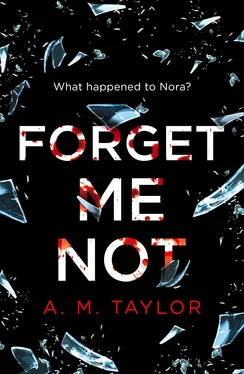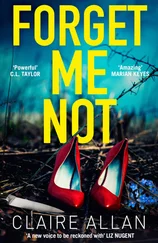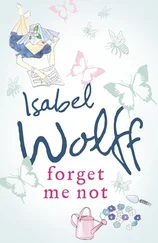So, I lay in bed and imagined the Altmans slowly waking up, getting dressed and gathering for breakfast. I could see them walking down the staircase that was still gazed down upon by dozens of photos of Nora; I could see them settling down at the large table in the kitchen, coffee smells trailing through the house, snow falling outside the window just as it was falling outside mine. More likely, Noelle and Noah were getting themselves ready for school while Nate packed up to head home to Texas. Jonathan had probably already left for work, and Katherine would still be in bed, staring as blankly up at her ceiling as I had when I first woke up.
I couldn’t have known that Noelle wasn’t there, that Nate was the first to realize, that he tapped gently at his mother’s bedroom door, had to shake her to get her attention and ask where his younger sister was. That when he rang Elle’s phone it went straight to voicemail and a bubble of panic began to build somewhere near his duodenum, and Noah looked on, his wide brown eyes taking everything in. That Nate rang his dad next who was on his way to his law practice in Madison, where he spent most of the week, and that Jonathan couldn’t pick up because he hadn’t set up his hands free that morning because he didn’t want to speak to anyone that day at least not yet. That eventually Nate rang Elle’s girlfriend, Jenna, who said she hadn’t seen her since Saturday, and then finally he rang his buddy, Leo, who was already at the scene and suddenly that bubble of panic popped except it turned into a tidal wave rather than disappearing into air and he had to struggle to keep up with what Leo was saying because it couldn’t possibly be true.
It might have been around that time that my own phone rang again, Ange’s name popping up on my screen. She told me she’d be over to pick me up in an hour to take me back to Madison, and I pushed my covers off, body aching, limbs too heavy, preparing myself for a shower.
I suddenly couldn’t wait to get back to Madison, not because there was anything waiting for me there, but because waking up in that house, in the exact same spot I’d woken up ten years before, only to hear the news that Nora was missing, had too much poetic symmetry for me to handle at any one moment. My teenage bedroom rang with her memory, every inch of that room simply sang with her presence, low and clear, piercing; there was nowhere I could look that didn’t bear some trace of her. Perhaps I should have relished that. Especially on that morning. But really all I wanted was to get away from it all. I didn’t need to have the memory of Nora screaming at me from every wall and every corner to remember her any better, to miss her anymore than I already did. I wanted to hide somewhere deep and dark where Nora had never been, and do my very best to leapfrog over that day. But that was never going to be a possibility. Not that day.
I showered and dressed in the same clothes I’d been wearing the day before for no reason other than when I’d packed to go home I hadn’t been able to think beyond the memorial. Mom had already left for work by the time I made it down to the kitchen, and my dad, who was a retired school principal—my high school principal, in fact—was sat in the breakfast nook drinking coffee. The familiarity of my family home, the sight of Dad reading the newspaper, the muffled light of the kitchen as snow crowded the window pane, crouched over me as it always did when I was back there: Here was my home, a reluctant sanctuary, and yet I did not feel safe. I never did.
“Morning, Mads,” Dad said, glancing up from the paper as I wandered past to help myself to coffee and maybe even a bowl of cereal.
“Morning.”
“When are you heading back?”
“Soon. Ange will be over to pick me up in an hour or so.”
Dad nodded, sipping at his coffee as I leaned back against the kitchen counter and took a long drag from my mug.
“When are you planning to take your car in to get fixed?”
“I can’t afford it,” I said shrugging, “not right now anyway.”
“We can lend you the money.”
“It’s fine, Dad. I just need to save a little money and I’ll get it done.”
“But how will you get around until then?”
“I can just get the bus, it’s not the end of the world.”
Dad looked out the window at the snow and then back at me, an eyebrow raised in skepticism. “You can borrow the Explorer if you want? I don’t use it so much anymore anyway.”
I shook my head. “Dad, if I left you without a car you’d basically be stranded whenever Mom left the house. It’s fine, don’t worry about it.”
“But the bus—”
“Is a perfectly legitimate form of public transportation.”
“Okay, okay, I get it. I’ll back off.”
“Thank you.”
There was a slight pause while Dad weighed out his words and said: “You know your mom and I are always happy to—” his voice trailed off but his words still managed to fill the room, unspoken yet heard loud and clear.
I’d lost count of the number of times we’d had this conversation. It wasn’t always that exact conversation, of course; it wasn’t always about my broken-down, practically worthless VW. Sometimes it was about rent or my meds, occasionally about the cost of therapy and health insurance. It was always there, the helping hand, perennially extended out towards me along with the tendrils of guilt that inevitably accompanied it whenever I took it. But guilt pounded its way through my life, relentless and as all-encompassing as rain in a summer storm, regardless of whether I accepted the help that was offered me.
“I know, Dad.” I said at last.
“Okay, I just thought it needed to be said. Because you’ve been doing really well recently, but if you need a little help with money, then that’s okay. And I know yesterday must have been hard for you, not to mention today, but we just want you to stay on the right track.” He said it all in a slight rush, even though he normally spoke slowly, thoughtfully. He’d obviously worked up to this a bit, not wanting to spook me, as if I was a highly strung racehorse. I wondered if he and Mom had discussed it before she left for work that morning, or maybe even the previous night when I stumbled in through the front door, a little worse for wear.
I thought about every bitten back word I’d never spoken to my parents, and every catapult line I’d thrown out at them and wished I’d pulled back on. It had been a long ten years, and I couldn’t help feeling that I’d made it even longer. The guilt I felt over losing Nora had seeped out, into, and over everything, and eventually evolved into a guilt about feeling guilty; hell, it might even have been guilt over having any feelings at all. There’s no manual for grief, and there certainly isn’t one for being someone a missing person leaves behind; but however you were meant to act in the face of the impossible, I was pretty sure that I’d failed. Everything I did was filtered through that failure, grimy with that guilt, and as much as I hated asking for help, I seemed to be in need of it, all the time. I wanted, desperately, to get to a place where that helping hand didn’t immediately feel like a punch to the gut, but I had no idea how to get there, no idea if I ever would.
I nodded, staring into my coffee cup. I could feel the grief building in me. The small round rock of loss that lived somewhere around my abdomen and rose through my stomach and lungs, and up through my esophagus until it stayed somewhere right at the back of my throat, threatening tears and an inability to breathe. Sometimes it rose even further and lived for days inside my head, growing moss, clouding my thoughts and vision. Those were the days my limbs felt too heavy to get out of bed. Those were the days that had taught me that sometimes it was easier to say nothing at all. I had to be careful here, to maneuver myself around all the ways I might trip up, or fall down, or however you want to put it, because if I didn’t, if I didn’t look for the signs and pay attention, that rock would get bigger and bigger and heavier and heavier and I wouldn’t make it out of the house, let alone back to Madison.
Читать дальше












